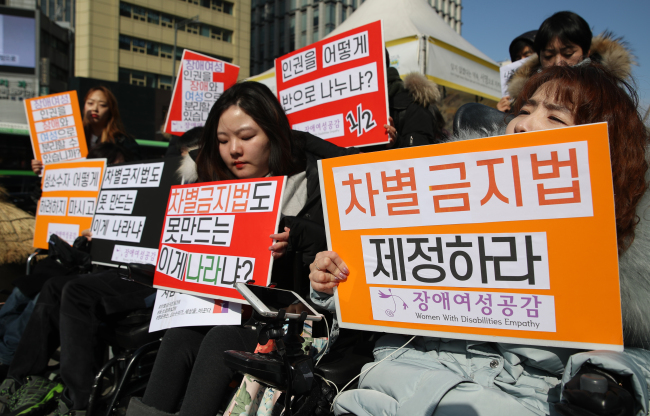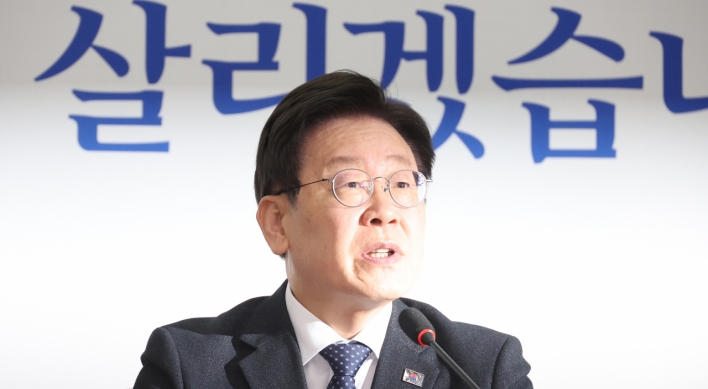Civic groups called for the enactment of an anti-discrimination act Thursday, taking a swipe at presidential hopefuls who have been reluctant to support the law in the face of fierce opposition from Protestant and conservative groups.
An association of 112 civic groups advocating sexual minorities, women, the disabled and migrant workers said that an anti-discrimination act would be a minimum tool to provide the socially marginalized with much-needed protection.
An association of 112 civic groups advocating sexual minorities, women, the disabled and migrant workers said that an anti-discrimination act would be a minimum tool to provide the socially marginalized with much-needed protection.

“The anti-discrimination act is not only for sexual minorities. It is to protect the dignity of the socially marginalized,” they said in a press conference held at Gwanghwamun Square in central Seoul. “The enactment of the anti-discrimination act is the first step to achieve social integration and raise awareness of human rights in Korean society.”
They condemned leading presidential hopefuls who have expressed support for sexual minorities but have opposed the enactment of an anti-discrimination law just yet, saying it is “insulting” to see them trying not to go against “those who incite discrimination.”
Among them is leading opposition presidential hopeful Moon Jae-in of the Democratic Party of Korea. He drew criticism from human rights groups after expressing opposition to the passage of an anti-discrimination act and same-sex marriage, saying there is no social consensus.
“There is already a law that prevents people from being discriminated against or excluded on grounds of their sexual identities. Our party does not want to cause unnecessary controversy by additionally enacting an anti-discrimination law,” he said.
Among presidential aspirants, Sim Sang-jeung of the minor opposition Justice Party is the only contender who supports the enactment of an anti-discrimination act.
South Korea has no law that bans discrimination and inflammatory remarks in public.
For now, the National Human Rights Commission of Korea receives complaints and investigates when discrimination takes place. It imposes recommendations, but they have no legally binding force.
Several anti-discrimination bills aimed at rooting out bigotry on such grounds as gender, disability, age, race, marital status and religion have been submitted to the National Assembly since the liberal Roh Moo-hyun administration’s first attempt to turn it into law in 2007.
But they have all either been scrapped or never passed through the National Assembly due to Protestant groups’ strong resistance.
Protestant groups largely believe such a law would help expand homosexuality and undermine the Bible’s teachings.
“Let me ask people who say it is not time yet to enact an anti-discrimination act: What do you say about the reality in which hatred and violence are taking place?” the groups posed.
According to a new report by the National Human Rights Commission, hate speech is prevalent in Korean society against sexual minorities, women and the disabled.
The poll of 1,014 people showed that 94.6 percent of the surveyed came across hate speech of sexual minorities online, followed by 83.7 percent who experienced it against women and 79.5 percent against the disabled.
As for offline hate speech, sexual minorities were most victimized, with 87.5 percent, followed by the disabled with 73.5 percent and women with 70.2 percent.
By Ock Hyun-ju (laeticia.ock@heraldcorp.com)
-
Articles by Ock Hyun-ju







![[Hello India] Hyundai Motor vows to boost 'clean mobility' in India](http://res.heraldm.com/phpwas/restmb_idxmake.php?idx=644&simg=/content/image/2024/04/25/20240425050672_0.jpg&u=)










